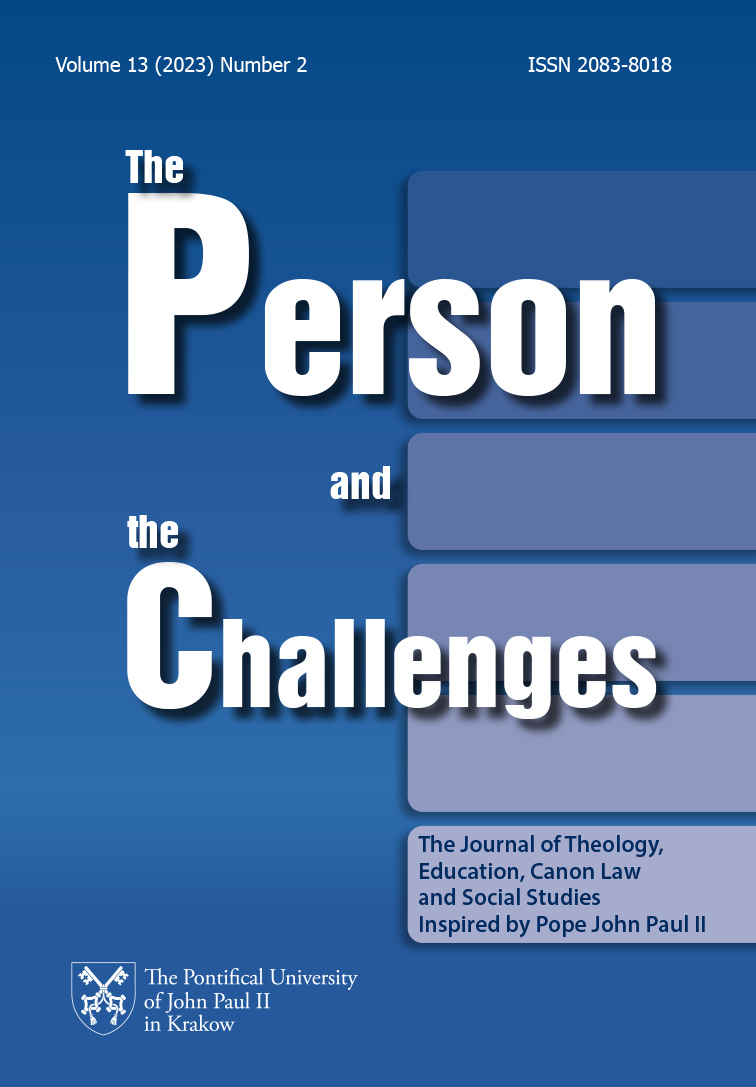The Perspective of Archival Discoveries in the Study of Karol Wojtyła’s Philosophy
DOI:
https://doi.org/10.15633/pch.13207Keywords:
Karol Wojtyła, Étienne Gilson’s historical-philosophical method, archives, manuscripts, philosophy, history of philosophyAbstract
The aim of this paper is to present archival discoveries made, among others, by the author in the Archives of the Metropolitan Curia in Cracow. The discoveries concern the manuscript of Karol Wojtyła, and are connected to his work on the postdoctoral thesis. This discovery was also presented in the context of its possible influence on the study of Wojtyła’s philosophy, based on Etienne Gilson’s conception of the method of studying the history of philosophy (the necessity of considering the whole of thought in the context of its individual elements, the context of impersonal necessity, etc.).
References
Andrzejuk A., Gilsonian metohd of the history of philosophy, “Rocznik Tomistyczny” 9 (2020) No. 2, pp. 133–144.
Andrzejuk A., Koncepcja filozofii średniowiecznej jako filozofii chrześcijańskiej i niektóre jej konsekwencje w ujęciu Etienne Gilsona, in: Etienne Gilson. Filozofia i mediewistyka, ed. T. Klimski, Warszawa 2007, pp. 49–56, publ. Wydawnictwo UKSW.
Aristotle, Etyka Nikomachejska, Kraków 1956, publ. PWN.
Czerkawski J., Gilsonowska koncepcja historii filozofii, “Roczniki Filozoficzne” 13 (1965) No. 1, pp. 61–72.
Gilson E., Doctrinal History and its Interpretation, ‘Speculum’ Vol. 24, No. 4, Oct. 1949, pp. 483–492.
Gilson E., Jedność doświadczenia filozoficznego, Warszawa 1968, publ. PAX.
Gilson E., The Unity of Philosophical Experience, New York 1937, publ. Scribner’s Sons.
Gogacz M., O pojęciu i metodzie historii filozofii, “Ruch Filozoficzny” 25 (1966) No. 1/2, pp. 76–80.
Gogacz M., Rola historii filozofii w filozofii Boga, “Studia z filozofii Boga”, ed. B. Bejze, Vol. 3, Warszawa 1977, pp. 365–413, publ. ATK.
Gogacz M., W sprawie koncepcji historii filozofii, “Zeszyty Naukowe KUL” 7 (1964) No. 3, pp. 53–57.
Ingarden R., Wykłady i dyskusje z estetyki, Warszawa 1981, publ. PWN.
Inwentarz spuścizny Karola Wojtyły w archiwum Kurii Metropolitalnej w Krakowie, t. I, Akta personalne i korespondencja (1920–1978), edited by A. Kędra and M. Makowska, Kraków 2020, Wydawnictwo św. Stanisława BM.
Janeczek S., Między filozoficzną historią filozofii a historią kultury. Z rozważań nad metodą historii filozofii w Polsce, “Roczniki Filozoficzne” 55 (2007) No. 1, pp. 89–108.
Judycka J., Koncepcja historii filozofii Etienne`a Gilsona. (Główne tezy referatu wygłoszonego w ramach projektu “Historia filozofii jako problem filozoficzny” w dniu 17.02.2011), https://studylibpl.com/doc/886752/historia-filozofii-w-uj%C4%99ciu-etienne-a-gilsona (21.02.2022).
Koneczny F., Cywilizacja bizantyńska, vol. I–II, Warszawa 2020, publ. Capital.
Koneczny F., Cywilizacja żydowska, vol. I–III, Warszawa 2019, publ. Capital.
Mączka J., Joachima Metallmanna rozumienie prawdy, “Studia z Filozofii Polskiej” 15 (2020), pp. 257–277.
Milcarek P., Rozumienie filozofii chrześcijańskiej przez Etienne Gilsona, in: Etienne Gilson. Filozofia i mediewistyka, ed. T. Klimski, Warszawa 2007, pp. 37–48, publ. Wydawnictwo UKSW.
Scheler M., Der Formalismus in der Ethik und die materiale Wertethik, Halle a.d.S. 1921, publ. Max Niemeyer.
Wojtyła K., (Rec.) Cz. Znamierowski, Zasady i kierunki etyki, Warszawa 1958, “Zeszyty Naukowe KUL” 1 (1958) No. 1, pp. 76–78.
Wojtyła K., (Rec.) F. Bednarski, Przedmiot etyki w świetle zasad św. Tomasza z Akwinu, Lublin 1956, “Roczniki Filozoficzne KUL” 6 (1958) No. 2, pp. 133–136.
Wojtyła K., Ewangeliczna zasada naśladowania. Nauka źródeł Objawienia a system filozoficzny Maxa Schelera, “Ateneum Kapłańskie” 55 (1957) No. 1, pp. 57–67.
Wojtyła K., O metafizycznej i fenomenologicznej podstawie normy moralnej (w oparciu o koncepcje św. Tomasza z Akwinu oraz Maksa Schelera), “Roczniki Teologiczno-Kanoniczne” 6 (1959) No. 1–2, pp. 99–124.
Wojtyła K., Ocena możliwości zbudowania etyki chrześcijańskiej przy założeniach systemu Maxa Schelera, in: Karol Wojtyła. Zagadnienie podmiotu moralności, eds. T. Styczeń, J. W. Gałkowski, A. Rodziński, A. Szostek, series Źródła i monografie No. 119 (Człowiek i moralność), Lublin 1991, publ. Wydawnictwo Towarzystwa Naukowego Katolickiego Uniwersytetu Lubelskiego, pp. 11–128.
Wojtyła K., Problem oderwania przeżycia od aktu w etyce na tle poglądów Kanta i Schelera (Studium), “Roczniki Filozoficzne” 5 (1955–57) No. 3, pp. 113–140.
Downloads
Published
Issue
Section
License

This work is licensed under a Creative Commons Attribution 4.0 International License.
Authors who publish with this journal agree to the following terms:
- Authors retain the copyright and full publishing rights without restrictions, and grant the journal right of first publication with the work simultaneously licensed under a Creative Commons Attribution 4.0 International License that allows others to share the work with an acknowledgement of the work's authorship and initial publication in this journal.
- Authors are able to enter into separate, additional contractual arrangements for the non-exclusive distribution of the journal's published version of the work (e.g., post it to an institutional repository or publish it in a book), with an acknowledgement of its initial publication in this journal.
- Authors are permitted and encouraged to post their work online (e.g., in institutional repositories or on their website) prior to and during the submission process, as it can lead to productive exchanges, as well as earlier and greater citation of published work (See The Effect of Open Access).

